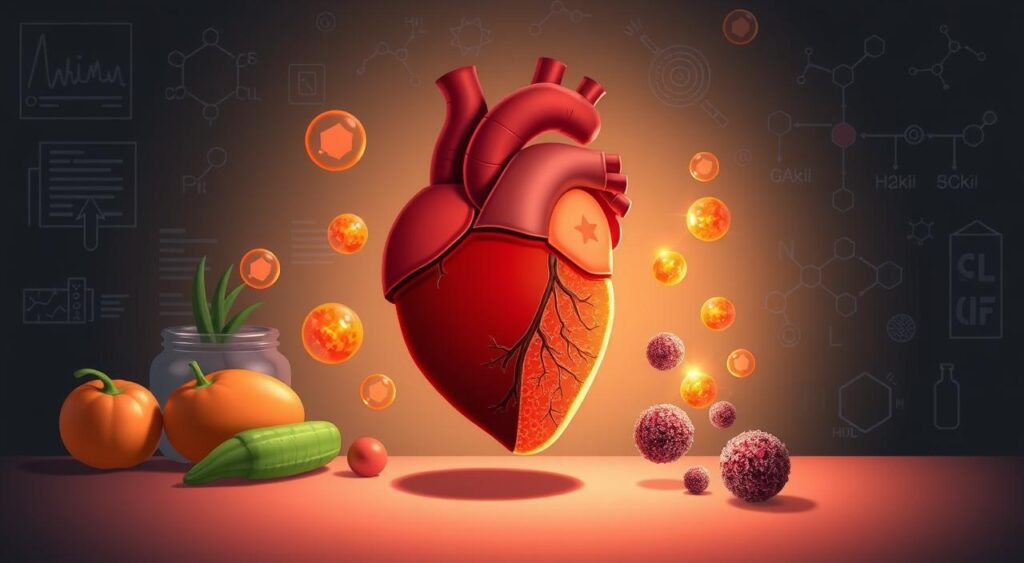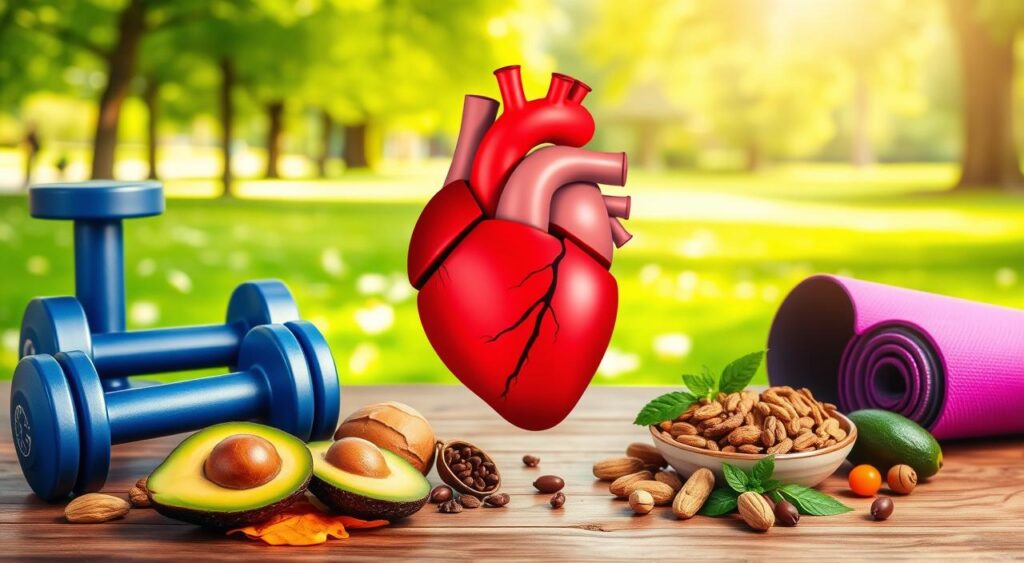Understand the factors that lead to isolated low HDL cholesterol, the potential consequences, and effective treatments to improve this lipid imbalance.
About 22% of American adults have low HDL cholesterol, known as “good” cholesterol. This condition, isolated low HDL cholesterol, means you have low HDL but other lipids are normal. It raises your risk of heart disease, so knowing its causes, risks, and treatments is key.
Isolated low HDL cholesterol is a big health worry. It can up your risk of heart disease and stroke. It’s caused by genetics and lifestyle, like diet, exercise, and smoking. Knowing how it affects health is vital for finding good treatments and prevention.

It’s important to tackle isolated low HDL cholesterol to lower heart disease risk. By learning about its causes, risks, and treatments, you can manage your cholesterol. This can be done through lifestyle changes, diet, and medical help, as we’ll explore next.
Key Takeaways
- Isolated low HDL cholesterol is a condition where an individual has low levels of HDL cholesterol, but their other lipid profiles are within normal ranges.
- Low high-density lipoprotein cholesterol can increase the risk of cardiovascular disease.
- Genetic and lifestyle factors, including diet and exercise, can contribute to isolated low HDL cholesterol.
- Understanding the causes, risks, and treatment options for isolated low HDL cholesterol is crucial for developing effective prevention strategies.
- Lifestyle modifications, dietary changes, and medical treatments can help manage isolated low HDL cholesterol.
- Addressing isolated low HDL cholesterol can reduce the risk of heart disease and stroke.
Understanding Isolated Low HDL Cholesterol
Isolated low HDL cholesterol, also known as hdl deficiency, is when someone has low HDL cholesterol but normal other cholesterol levels. HDL cholesterol helps remove extra cholesterol from the blood and sends it to the liver. Low HDL cholesterol levels can raise the risk of heart disease.
Knowing about isolated low good cholesterol and its health impact is key. Even with normal cholesterol levels, low HDL is a concern. HDL helps prevent plaque buildup in arteries, which can cause heart attacks and strokes.
To grasp the impact of isolated low HDL cholesterol, consider these points:
- Normal vs. low HDL levels: What are the normal ranges for HDL cholesterol, and how do low levels affect health?
- The role of HDL in cardiovascular health: How does HDL cholesterol help to protect against heart disease, and what are the consequences of having low levels?
- The significance of “isolated” low HDL: What does it mean to have low HDL levels in the absence of other cholesterol imbalances, and how is this condition diagnosed and treated?
Understanding isolated low HDL cholesterol’s causes and effects helps manage the condition. This may involve lifestyle changes like more exercise and a healthy diet. Working with a healthcare provider to create a treatment plan is also important.
The Role of HDL in Cardiovascular Health
High-density lipoprotein (HDL) is key to keeping our hearts healthy. It helps remove bad cholesterol from our arteries. Low HDL levels can raise the risk of heart attacks and strokes. Studies show that people with low HDL levels are more likely to get heart disease.
HDL does many important things to protect our hearts. It includes:
- Removing extra cholesterol from the blood
- Stopping plaque buildup in arteries
- Lowering inflammation in the heart and blood vessels
Keeping low HDL levels in check is vital for heart health. By knowing how HDL works and keeping it healthy, we can lower our heart disease risk. This helps us stay well overall.
| HDL Level | Category | Risk of Cardiovascular Disease |
|---|---|---|
| 60 mg/dL or higher | High | Low |
| 40-59 mg/dL | Medium | Moderate |
| Less than 40 mg/dL | Low | High |
Risk Factors Leading to Low HDL Levels
Low HDL levels, or hdl-c deficiency, can come from genetics, lifestyle, and health issues. Knowing these factors helps in managing and preventing low HDL levels. Studies show that people with a family history of low HDL levels are more at risk.
Some lifestyle choices can also lead to low HDL levels. These include eating too much saturated fat and cholesterol, not exercising enough, and smoking. Regular exercise and a balanced diet can boost HDL levels and lower the risk of hdl-c deficiency. Also, conditions like diabetes and high blood pressure can raise the risk of low HDL levels.
Genetic Factors
- Family history of low HDL levels
- Genetic mutations that affect HDL production
Lifestyle Contributors
- Diet high in saturated fats and cholesterol
- Lack of physical activity
- Smoking
Medical Conditions
- Diabetes
- High blood pressure
- Obesity
By knowing these risk factors, people can take steps to manage and prevent low HDL levels. This reduces the risk of hdl-c deficiency and related health issues.
Diagnosing HDL Cholesterol Deficiency
Checking for low good cholesterol levels is key to staying healthy. A blood test measures HDL levels. Doctors look at these levels to see if they’re low. Getting regular cholesterol tests helps catch problems early.
Doctors consider a few things when checking for low HDL cholesterol:
- Family history of low HDL cholesterol
- Age and sex
- Medical history, including existing health conditions
- Lifestyle factors, such as diet and exercise habits
Low good cholesterol can raise heart disease risk. So, it’s important to work with a doctor to improve HDL levels. This might mean changing your diet, exercising more, or taking medicine.

Knowing how to diagnose low good cholesterol and managing HDL levels can lower heart disease risk. It helps keep you healthy and feeling good.
Health Implications of Low HDL-C
Having low HDL-C levels can harm your health a lot. It can make you feel not so well and raise your risk of getting sick. Low HDL cholesterol helps remove extra cholesterol from your blood.
People with low HDL levels face cardiovascular risks. This includes heart attacks, strokes, and diseases in the arteries. Also, low HDL levels can lead to metabolic syndrome. This is a group of conditions that raise your risk of diabetes and heart disease.
Cardiovascular Risks
Studies show that low HDL levels can cause plaque to build up in arteries. This is a big worry for people with isolated low hdl-c. They might not have other heart disease risk factors.
Long-term Health Consequences
Low HDL levels can also lead to kidney disease and some cancers. It’s very important for those with isolated low hdl-c to talk to their doctor. They need to make a plan to manage their condition and lower their health risks.
Medical Treatments for Low HDL
People with hdl cholesterol deficiency need medical help to boost their HDL levels. Doctors often prescribe fibrates, niacin, and statins for this. These drugs can raise HDL, cut down triglycerides, and lower LDL cholesterol.
These treatments can lower the risk of heart disease and improve blood lipid levels. But, it’s important to talk to a doctor about possible side effects. Some drugs might harm the liver or cause muscle pain.
Changing your diet and getting more exercise are also part of the treatment. Here are some key points to remember:
- Medications: fibrates, niacin, and statins
- Lifestyle modifications: dietary changes, increased physical activity
- Regular monitoring: blood lipid profiles, liver function, and other health markers
Working with a healthcare provider is key to finding the right treatment for hdl cholesterol deficiency. Combining medicine with lifestyle changes can help manage low HDL cholesterol. This approach can also lower the risk of heart disease.
| Treatment | Benefits | Potential Side Effects |
|---|---|---|
| Fibrates | Increase HDL levels, reduce triglycerides | Liver damage, muscle pain |
| Niacin | Increase HDL levels, reduce LDL cholesterol | Flushing, liver damage |
| Statins | Lower LDL cholesterol, reduce cardiovascular risk | Muscle pain, liver damage |
Dietary Strategies to Increase HDL Cholesterol
People with low HDL cholesterol can improve their levels with diet changes. Eating heart-healthy foods is key. Foods like salmon and walnuts, rich in omega-3s, boost HDL.
Following the Mediterranean diet can also help. It focuses on fruits, veggies, whole grains, and healthy fats. Adding soluble fiber to your diet can also raise HDL.
Heart-Healthy Foods
- Fatty fish, such as salmon and mackerel
- Nuts and seeds, such as walnuts and chia seeds
- Avocados and olive oil
Changing your diet can improve HDL levels. But, always talk to a doctor before making big diet changes. They can give you advice tailored to your needs.
Exercise and Physical Activity Guidelines
Regular exercise is key to boosting good cholesterol levels. Studies show that physical activity can raise HDL cholesterol. This lowers the risk of heart disease. Aim for at least 150 minutes of moderate exercise or 75 minutes of vigorous exercise weekly.
Here are some activities that can help improve HDL levels:
- Brisk walking
- Swimming
- Cycling
- Running
These can be part of your daily life, like taking the stairs or walking to work. Strength training also boosts HDL, especially when done with aerobic exercises.

The right exercise plan depends on your health and goals. Talk to a doctor to find the best workout for you. Regular physical activity is a big step towards better heart health and disease prevention.
| Physical Activity | Duration | Frequency |
|---|---|---|
| Brisk walking | 30 minutes | 5 days a week |
| Swimming | 20 minutes | 3 days a week |
| Cycling | 30 minutes | 5 days a week |
Lifestyle Modifications for HDL Management
Managing hdl deficiency and low hdl levels needs a full approach. This includes making lifestyle changes. These changes can greatly improve your health and HDL cholesterol levels. By living a healthy lifestyle, you can lower your risk of heart disease and feel better overall.
One important change is to quit smoking. Smoking is a big risk for low hdl levels and makes hdl deficiency worse. Also, keeping a healthy weight through diet and exercise can boost HDL levels. Reducing stress with meditation or yoga can also help HDL cholesterol.
Smoking Cessation
- Quitting smoking can increase HDL levels by up to 10%
- Nicotine replacement therapy and counseling can aid in the quitting process
- Avoiding secondhand smoke is also crucial for maintaining healthy HDL levels
Weight Management
Keeping a healthy weight through a balanced diet and exercise can improve HDL levels. Aim for a body mass index (BMI) between 18.5 and 24.9. This can help lower the risk of hdl deficiency and low hdl levels.
Stress Reduction
Chronic stress can harm HDL levels. Activities like meditation, yoga, or deep breathing can help. By making these lifestyle changes, you can actively manage your HDL levels and lower heart disease risk.
| Lifestyle Modification | Impact on HDL Levels |
|---|---|
| Quitting smoking | Increase HDL levels by up to 10% |
| Maintaining a healthy weight | Improve HDL levels and reduce risk of hdl deficiency |
| Reducing stress | Help mitigate negative impact on HDL levels |
Monitoring and Long-term Management
Keeping an eye on HDL cholesterol levels is key for long-term health. This is especially true for those with hdl-c deficiency. It helps make changes to treatments and lifestyle to keep HDL levels healthy. This reduces the risk of heart diseases.
People with low good cholesterol need to team up with their doctors. Together, they can create a plan to watch and manage HDL levels. This might include regular check-ups, lifestyle changes, and medicines if needed.
Important parts of long-term care include:
- Healthy diet and exercise habits
- Stress reduction techniques
- Smoking cessation
- Weight management
By focusing on ongoing monitoring and care, people can manage their hdl-c deficiency well. This helps lower the risk of heart diseases.
Conclusion: Taking Control of Your HDL Health
Understanding and managing isolated low HDL-C is key for good heart health. This article has covered why HDL cholesterol matters, what risks can lower it, and how to increase it.
HDL cholesterol deficiency can be changed to lower heart disease risk. Making healthy lifestyle choices, like eating well and exercising, can help. Managing stress is also important.
Keep an eye on your HDL levels and work with your doctor to create a plan for isolated low HDL-C. With the right medical care and lifestyle changes, you can improve your HDL health. This helps keep your heart healthy for the long term.
FAQ
Q: What is HDL cholesterol?
A: HDL (high-density lipoprotein) cholesterol is called “good” cholesterol. It helps remove “bad” cholesterol from your blood.
Q: What are normal and low HDL levels?
A: For adults, normal HDL levels are 40 mg/dL or higher for men and 50 mg/dL or higher for women. Levels below these are considered low.
Q: What is “isolated” low HDL cholesterol?
A: “Isolated” low HDL cholesterol means you have low HDL but your LDL and total cholesterol are normal.
Q: What are the risk factors for low HDL levels?
A: Low HDL levels can be due to genetics, lifestyle (like a bad diet or smoking), or certain health conditions.
Q: How is HDL cholesterol deficiency diagnosed?
A: A blood test measures HDL cholesterol levels. Healthcare providers check these levels to see if they’re low.
Q: What are the health implications of low HDL-C levels?
A: Low HDL-C levels increase the risk of heart disease and other health problems. Keeping HDL levels healthy is key for heart health.
Q: What medical treatments are available for low HDL cholesterol?
A: Treatments include medications like statins and lifestyle changes. Your doctor might suggest a diet or supplements to help.
Q: What dietary strategies can help increase HDL cholesterol?
A: Eating heart-healthy foods like nuts and avocados can boost HDL. Following the Mediterranean diet and using omega-3 supplements also helps.
Q: How can exercise and physical activity impact HDL levels?
A: Exercise increases HDL cholesterol. Aim for aerobic, strength training, and high-intensity workouts to keep HDL levels up.
Q: What lifestyle modifications can help manage HDL cholesterol?
A: Quit smoking, maintain a healthy weight, and reduce stress to manage HDL. These changes improve overall health and HDL levels.
Q: Why is ongoing monitoring and management of HDL levels important?
A: Regular HDL checks are vital for health management. They help doctors adjust treatments and lifestyle changes to keep HDL levels healthy.
